#from Lucas Pope the creator of Papers Please
Explore tagged Tumblr posts
Text
LOST AT SEA, 1803
the good ship
"OBRA DINN"
----------------
Built 1796, London ~ 800 tons, 18ft draught
Captain R. WITTEREL ~ Crew 51 men
Last voyage to Orient ~ Cape rendezvous unmet
----------------
Contact East India Cy. London Office
for enquiries or testimony
-------------------------------------------------------------------------------------
In 1802, the merchant ship
Obra Dinn
set out from London for the Orient with over 200 tons of trade goods. Six months later it hadn't met its rendezvous point at the Cape of Good Hope and was declared lost at sea.
Early this morning of October 14th, 1807, the Obra Dinn drifted into port at Falmouth with damaged sails and no visible crew. As insurance investigator for the East India Company's London Office, dispatch immediately to Falmouth, find means to board the ship, and prepare an assessment of damages.
#play Return of the Obra Dinn please!#if you enjoy reasoning at all- inductive and deductive#if a magic stopwatch that allows you to see in full detail the moment of a corpse's death and hear the moments leading up to it sounds like#as good a storytelling mechanism as it is. it really is so good#from Lucas Pope the creator of Papers Please#obra dinn#this is the steam store description no credit goes to me
13 notes
·
View notes
Text
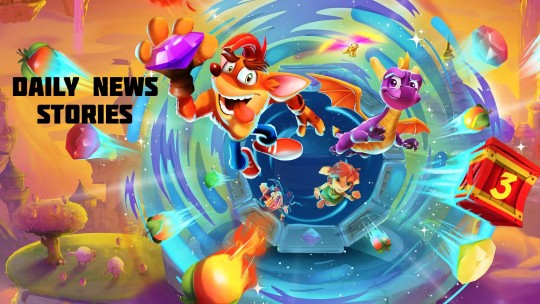
Video Game News Stories for March 3, 2024
Mars After Midnight Lands on the Playdate: The innovative Lucas Pope, known for "Papers, Please," has launched his latest creation, "Mars After Midnight," on the Playdate console. This narrative adventure combines text-based storytelling with unique puzzle mechanics, offering an engaging experience for fans of Pope's previous works.
Call of Duty: Warzone Mobile Prepares for Deployment: Mobile gamers rejoice! Call of Duty: Warzone Mobile is scheduled to launch on March 21st, 2024, bringing the popular battle royale experience to smartphones and tablets. This free-to-play title promises fast-paced action and intense competition for mobile gamers.
PlayStation Plus Offers Sifu and Destiny 2 Expansion: PlayStation Plus subscribers have something to look forward to this month. Starting March 7th, 2024, they can download the critically acclaimed beat-em-up "Sifu," featuring a unique aging mechanic, alongside the "Destiny 2: Witch Queen" expansion.
Industry Updates:
Saber Interactive Considers Independence: Embracer Group subsidiary Saber Interactive is reportedly exploring the possibility of becoming a private company again. This potential move comes after Embracer's acquisition of several studios, raising questions about the future direction of Saber Interactive.
Toys for Bob Goes Independent: Following recent layoffs at Xbox Game Studios, developer Toys for Bob, known for the "Crash Bandicoot N. Sane Trilogy," has announced its independence. The studio's future plans remain unclear, but their decision to go independent signifies a shift in the gaming industry landscape.
Looking Ahead:
Gamers can mark their calendars for these upcoming releases:
No Rest for the Wicked: From the creators of the "Ori" series, Moon Studios, comes their next project, "No Rest for the Wicked." This action RPG is set to enter Early Access on Steam on April 18th, 2024.
The Last of Us Part II HBO Series: Fans of Naughty Dog's award-winning game can experience the story in a new way with the premiere of "The Last of Us Part II" HBO series on April 20th, 2024.
Dragon Age: Dreadwolf: BioWare's highly anticipated sequel, "Dragon Age: Dreadwolf," is expected to arrive sometime in late 2024. Details remain scarce, but fans of the series are eagerly awaiting its release.
New Video Game Releases for March 5th - March 11th
Tuesday, March 5th:
The Outlast Trials (PC, PS4, PS5, Xbox One, Xbox Series X/S): The long-awaited sequel to the critically acclaimed horror series, The Outlast Trials, finally launches. This time, players face trials in a Cold War-era setting, trying to survive psychological and physical torment.
Quilts and Cats of Calico (PC): This cozy life simulator lets you manage a quilt shop and care for adorable cats.
Mediterranea Inferno (Switch, PS4, PS5, Xbox Series X/S): Experience a challenging action-adventure side-scroller set in a post-apocalyptic world inspired by Mediterranean mythology.
Wednesday, March 7th:
As Dusk Falls (PS4, PS5): This interactive drama tells the story of two families whose lives become intertwined after a robbery goes wrong. Your choices directly impact the narrative.
Snufkin: Melody of Moominvalley (Switch, PC): Explore the whimsical Moominvalley as Snufkin, encountering familiar characters and solving puzzles in this heartwarming adventure game.
The Pirate Queen: A Forgotten Legend (Quest 3, Quest 2, PC): Embark on a swashbuckling adventure in VR, uncovering ancient secrets and battling enemies as a daring pirate queen.
Friday, March 8th:
Akka Arrh (PS5, PS VR2): This rhythm game throws you into an immersive world of music and movement, requiring you to match the beat with your actions in VR.
Unicorn Overlord (PS4, PS5, Switch, Xbox One, Xbox Series X/S): Play as a mischievous unicorn who wreaks havoc on a fantasy kingdom in this quirky action-adventure game.
WWE 2K24 (PC, PS4, PS5, Xbox One, Xbox Series X/S): The latest installment of the popular wrestling franchise arrives, featuring updated rosters, new match types, and improved gameplay mechanics.
#video games#gaming#news#gaming news#toys for bob#no rest for the wicked#dragon age#dragon age dreadwolf
5 notes
·
View notes
Note
A medium of art you don't work in but appreciate
Refering to this.
Thank you for the ask! Let's answer this one too C: Adding this after the full answer, I'm gonna add a read more because it turned out quite long hahaha
7. A medium of art you don't work in but appreciate?
Ah, what medium of art don't I appreciate? I love art! I love reading, listening to music (and singing, but I'm not great at it hahah), sculpture, etc.
With reading, I mostly read fanfics lately, but I enjoy lots of typical books and authors too: Chaos Walking (Patrik Ness), the Lord of the Rings, Rick Riordan's books in general, MXTX's books, the Castle in the Sky. Those are the ones that come to mind first, my faves~ Of course, I include here manga and comics, there's sooo many I love as well. I do draw, but don't usually do comics (maybe someday!). Lately I've been loving Jujutsu Kaisen and Akagami no Shirayukihime, but I could recomend so many good ones.
With music I just always need some music if I'm not watching anything that has sound otherwise, I love so many kinds of styles, but I have a preference for melodic, mellow songs~ specially ones that I can sing along too. Lots of classical too (Chopin is my fave~). And piano is my fave instrument to listen to <3 I kinda talked about music already in the previous ask, so I won't go into more detail hahah
For sculpture I don't really have a particular artist I like, it's more a casual love. But all those "realistic" sculptures are mind blowing to me, how it seems completely real, specially fabric or expressions, but it's made of marble or another hard material.... man, so much talent, I admire them so much.
If we talk about drawing/painting I'm not proficient at but I still admire: watercolour is gorgeous and I am incapable of it. I love the art made with it! Oil and classic paintings as well, there's so many classic artists who have made amazing pieces. My fave is Monet! But I also greatly admire the ones from the victorian period in general. The way they render fabric and clothes is SO GOOD. I kinda emulate it unconsciously when I do my shadding ahah but I am sure it looks nothing like that xD Like, look at this art called "Flirtation" by Frédéric Soulacroix, that fabric 🙏🙏🙏 And the background is gorgeous too.

Also, I really enjoy watching movies/tv shows. Wether they're animation or not. Specially if they have good plot and/or if they have good photography/animation. There's so many beautiful works of arts in that medium as well. Ghibli movies are some of my faves (Howl's Moving Castle is my fave movie ever), Lord of the Rings movies are also masterpieces. I've also enjoyed lately the Poirot movies they've been making recently, they're really interesting and have great photography as well~
I have to say, I don't often watch theater/musicals because they're expensive and I'm broke af. But the times I went to see some, they're amazing as well 🙏 I'll include dance performances here too, because they're in a similar category to me.
I enjoy seeing architecture as well. My fave period for architecture is gothic! The way they did all those high arches and beautifully decorated walls. And the stained glasses! Sooo many great buildings!! Most of the ones I can see around where I live and was able to travel are churches or cathedrals. They are such beautiful buildings, even though I'm not religious in any sense at all, I always love visiting them and seeing them. But there's sooooo many amazing artstyles out there as well! Lique some Mosques are absolutelly stunning, with their intricate colorful patterns! There's so much good architecture to admire as well...
Also, I'll add that videogames are a form of art in my opinion as well, and I admire lots of creators. There's SO MUCH variety in this media, it's insane. Stuff like Return of Obra Dinn or Papers Please by Lucas Pope (who makes it all, including music, he's so talented), Baldur's Gate 3 (currently enjoying this one), Chants of Sennar, Binding of Isaac, Fire Emblem, Kingdom Hearts, etc. So many different styles but so fun and interesting. And also, so many good RPGs with amazing stories I don't think can be told in a better way using other media (Persona series, Tales of series, Dragon Age, the Nonary Games, Mother saga, Xenoblade Chronicles, etc.)
Sorry for the big rambling, I guess you didn't expect me to go into such a extended answer hahahah I really, really love all art of creation, it's such an amazing thing that someone visualizes something and can create it so everyone else can see.
I've said this over and over again, I wish I were filthy rich, so rich I could never ever use all my money, only so I could be an art mecenas (I think it's called patron in English, I like the word we use in Spanish tho XD) and give money to aaaall my favourite artists so they can just create without any worry at all, just focus on their art and not the money they need to make to survive. Just create their own stories, characters, art pieces, or create fanworks of any kind. I don't even want to request stuff I want to see, I just want to see what they want to create! What their mind can imagine and how they see the world!!!
Ah, if only...
Anyway, this has gone for long enough hahah thanks again for giving me the oppotunity to ramble~
And if you read till here, thanks as well for your time~ Feel free to send more questions for this ask~ (or anything else, really, if you want me to expand on any of these topics I mentioned here haha I'd be happy to~) P.D.: Just as I posted it, I also remembered tappestry/weaving/any kind of thread art. AND OF COURSE, fashion/outfit makers and designers!!! There's so much art in this world... so hard to remember it all, but it's all around us <3
2 notes
·
View notes
Text
The Rise of Indie Game Studios: Redefining the Gaming Landscape
In the ever-evolving realm of video games, indie game studios have emerged as powerful, innovative forces, shaping the industry with their unique visions and unconventional approaches. These independent developers, often small teams or even solo creators, have managed to carve out a significant niche, challenging the dominance of big-budget, mainstream studios. The rise of indie game studios not only democratizes game development but also brings fresh perspectives and creativity to players worldwide.

The Indie Game Revolution
The term "indie" refers to independence from major financial backers and publishers, allowing developers creative freedom to explore original ideas without corporate constraints. This freedom has led to a surge of diverse and experimental games that might not fit into the conventional molds of mainstream gaming.
Factors Fueling the Indie Movement
Several factors have contributed to the rise of indie game studios:
Accessibility of Development Tools: The advent of user-friendly game development platforms such as Unity, Unreal Engine, and GameMaker Studio has lowered the barrier to entry. Aspiring developers can now create high-quality games without the need for extensive technical knowledge or significant financial investment.
Digital Distribution Platforms: Services like Steam, itch.io, and the Nintendo eShop provide indie developers with accessible platforms to distribute their games globally. This has eliminated the need for physical production and distribution, significantly reducing costs and allowing developers to reach a vast audience.
Crowdfunding: Platforms like Kickstarter and Indiegogo have revolutionized how indie games are funded. By appealing directly to potential players, developers can secure funding and gauge interest in their projects before they are fully developed.
Online Communities and Social Media: Indie developers can now engage directly with their audience through social media and online forums. This interaction helps in building a loyal fanbase and gaining valuable feedback during the development process.
The Creative Freedom of Indie Studios
One of the hallmarks of indie game studios is their willingness to take risks and push boundaries. Without the pressure of satisfying corporate stakeholders, indie developers can explore niche genres, experimental gameplay, and unconventional narratives. This freedom often results in games that are more personal, innovative, and emotionally resonant.
Indie games often tackle themes and topics that mainstream games shy away from. Titles like "Papers, Please" by Lucas Pope, which simulates the experience of an immigration officer, and "Gone Home" by Fullbright, which explores family dynamics and LGBTQ+ issues, demonstrate the breadth and depth of storytelling that indie games can achieve.
Challenges and Future Prospects
Despite their successes, indie game studios face significant challenges. The sheer volume of games being released makes it difficult for individual titles to gain visibility. Additionally, financial stability can be precarious, with developers often relying on the success of a single game to fund future projects.
However, the future looks promising for indie game studios. The continued support from players, the evolution of funding and distribution models, and the ever-improving accessibility of development tools will likely sustain the growth of the indie game sector.
Conclusion
Indie game studios have undeniably reshaped the gaming industry, offering a refreshing alternative to mainstream titles. Their rise underscores the importance of creativity, diversity, and innovation in gaming. As technology continues to evolve and the gaming community expands, indie developers will remain at the forefront, crafting unique experiences that captivate and inspire players around the world.
0 notes
Text
Lucas Pope
Who are they? Lucas Pope is an indie game developer currently living in Japan with his wife, Keiko Ishizika, and their two children. Pope and his wife actually met while they were working together at Realtime, and continued seeing each other while Pope moved to Naughty Dog and Ishizika moved to the nearby 2K Games.
Where do they work/who for? Pope has worked with a number of different game companies, such as Naughty Dog, as well as smaller indie studios like Ratloop. More recently he's worked completely solo on projects. Currently he's working on a game for something called Playdate. A small, pocket sized console.
Social media handles and links: Twitter: @dukope Website: dukope.com Itch.io: Dukope Youtube: dukope1
What projects have they worked on? Lucas Pope's most famous projects that are associated with his name are Papers Please and Return of the Obra Dinn. Two breakout indie hits which garnered critical acclaim for their unique storytelling and innovative core gameplay loops. However, Pope also worked with NaughtyDog on Uncharted 1 and 2, as well as games like Gearhead Garage with Ratloop. He also has a number of other solo games to his name, like 6 Degrees of Sabotage and The Sea has no claim.
What do I know about these projects? The Lucas Pope games I know most about are Papers Please and Return of the Obra Dinn, because they're some of my favourite games ever. I know very little about his other work, as I've never really gone back and looked at it. I've played through Papers Please once or twice, and still haven't finished playing Obra Dinn. Papers Please won several awards for innovation, and was nominated for several more from it's release in 2013 to mid 2014, while Obra Dinn won a few awards, but was nominated for a lot more from it's release in 2018 through to 2019.
How do I know about this person? I first discovered Lucas Pope in around 2015 when some youtubers that I watched started doing let's plays of Papers Please. I remember thinking at the time that it was a really interesting new concept for a game, but I never really got any further than a passing interest. Then, over the next few years, my interest and investment in games as narrative mediums grew, and I began to find that every game that came out felt more and more bland and uninspired than the last. This was especially noticeable as I'd been a pretty big Assassin's Creed fan, mainly for the history but also the cool parkour gameplay. However, I soon became very aware of how repetitive the game was, and no matter what else I played, I couldn't shake the feeling that I'd seen it all before. Then, in 2018, Lucas Pope released Return Of The Obra Dinn, which cropped up on my radar pretty soon after release.
Why are they an inspiration to me? Pope is a very big inspiration to me because I discovered him at a time when I was beginning to get burned out on games and was feeling like they were simply going to stay stuck in the same bland, uninspired traditions that had been cementing themselves over the past decade, especially when it was feeling more and more like these games didn't take advantage of the uniqueness of the medium, (I'll talk about this more in a later blog post.) and instead made themselves into extra long movies in which you are permitted to pause for a while and shoot some guys. Pope's games came as a breath of fresh air to me. Games which actually used the strengths of games, as well as new and innovative core gameplay loops to tell interesting and unique stories. This showed me that games can do unique and interesting things and still be successful, and that lots of people were just as tired of everything as I was, and there are still creators out there who want to try and push the medium forward. This helped me decide that I wanted to become a game developer, because I wanted to be like Pope, and I still do. I want to try and tell new and interesting stories and do interesting things with games as a medium.
How did they get to where they are? Pope started out just working on different mods for games, like the Quake 1 total conversion mod Malice, which was the first project released by Ratloop. Pope moved from Ratloop to Realtime, and then to Naughty Dog, working on various projects throughout his time and developing his love of creating underlying tools, as well as experimental games. After finishing his work on Uncharted 2, he moved on from Naughty Dog and started working on experimental indie games along with his wife, Keiko.
What makes them stand out? He stands out in the industry for his willingness to push new ideas and gameplay loops. Pope likes to be experimental and try new things, and he's willing to put his name on the cover of his games in ways that creators usually don't. His games are innovative, original, beautifully designed and brimming with passion and character.
Images, videos and trailers: Papers Please trailer Return Of the Obra Dinn Trailer






1 note
·
View note
Text
Artists I took inspiration from
Lucas Pope: Lucas Pope has been a huge part of my game making journey and is one of my personal heroes. Creator of Papers Please and Return of the Obra Dinn, he showed me that it was still possible to create games with artistic integrity and original, yet engaging, core gameplay loops in an industry that I had long thought had fallen to dreary mediocrity. His 2018 game, Return of the Obra Dinn is one of my top 5 favourite games of all time, as it introduces unique and interesting detective gameplay and inspired me to start working on a passion project I've wanted to do for about 7 years now. However, his 2013 hit, Papers Please, has been more of an inspiration to this project specifically, due to its interesting family management system, which I've talked about in more depth in another blog post. However, for a brief overview, I really liked the way the system got players invested in the world and story. Look at any reviewer talk about the game and they'll say how tense and stressful it is to try and abide by the rules of the game whilst fretting that you're not going to be able to feed a fictitious family. That was an element I thought would be a really interesting thing to incorporate into my own project and see if I could pick apart the system enough to make it work in my own context.
An interesting interview with Lucas Pope where he talks about his development from his earliest work through to his 2018 hit, Obra Dinn.
Lucas Pope is a personal hero of mine, and although I'll probably never get to meet him and tell him just how much his games mean to me and how much they've influenced, and still influence, my own journey as a game developer, I will happily talk for hours on end about how I've stolen his mechanics and ideas in order to further develop my own work.
Hidetaka Miyazaki: Creator of the SoulsBorne games and Sekiro, Miyazaki is, in my personal opinion, an absolute genius. He's created some incredibly complex stories and lore that are still speculated on, upward of 10 years after the release of some games. I consistently look back at the SoulsBorne games for inspiration on how to do good level and world design, although that's obviously not been particularly pertinent to this project. I've also taken huge inspiration from his ability to construct stories through small amounts of exposition, along with his ability to know when to take his hands off the wheel and leave things open to interpretation. This is something I wanted to try my hand at in this project, although now with a retrospective look at my work, I can see that I barely touched on. I think the text parts of the game can be extremely expository in ways that perhaps aren't helpful, although I do think I did quite well at not getting hung up on unimportant details. Part of the lore of my game world is the idea that the world is at war. I intentionally included little-to-no information about the actual conflict and parties involved, as the whole point is that they're completely irrelevant to the main structure and narrative of the game, although I still think I'd like to have included small snippets of information, perhaps as newspaper clippings, throughout the play time.
Atlas and the Persona series: I really enjoy the game Persona 5, along with its various spin off games and TV shows. I really like the idea of taking stylistic inspiration from the persona series as a whole, because they're incredibly well stylized, going so far as to make menus feel slick, unique and immediately recognisable. I love the idea of making something as stylised and unique as a persona game, but it's an unrealistic goal for me at the moment because the persona games work with large teams of artists over years and years to create something so slick and neat, and I do not have that kind of time or artistic skill.
0 notes
Photo

Return Of The Obra Dinn May Still Come To Switch https://www.nexusgaming.online/return-of-the-obra-dinn-may-still-come-to-switch/ Return of the Obra Dinn, a narrative mystery game from Papers, Please creator Lucas Pope, surprised and delighted the world when it released on PC last year. It even cleaned up at both the IGF and GDC Awards just last month, so it's a game people really enjoyed playing. Much like every indie game, however, [...]
0 notes
Text

Context - The communist state of Arstotzka has ended a 6-year war with neighboring Kolechia and reclaimed its rightful half of the border town, Grestin. Your job as immigration inspector is to control the flow of people entering the Arstotzkan side of Grestin from Kolechia. Among the throngs of immigrants and visitors looking for work are hidden smugglers, spies, and terrorists. Using only the documents provided by travellers and the Ministry of Admission's primitive inspect, search, and fingerprint systems you must decide who can enter Arstotzka and who will be turned away or arrested. Game Length - Story mode takes at least 4 hours to reach one of the main endings. The game is divided into days and there are 31 days in all. Retrying days or getting multiple endings takes longer.
How many endings are there? - There are 20 different endings. Some are small variations of others. 8 of the endings are attained by completing the entire game in different ways. Endings are based on the decisions you make each day. The amount of money earned has an influence on several of the endings.
(^from the Papers, Please official website)



Papers, Please is a critically acclaimed game set in a border checkpoint in the fictional totalitarian country of Arstotzka in 1982. The player takes the role of an immigration officer who has to inspect documents and interrogate people attempting to enter the country. Progress is achieved through efficiently processing immigrants each day in order to earn enough money to keep your family alive and well. The game has been described as having multiple genres: a paperwork simulator, an emotionally compelling puzzle game, or, as the creator Lucas Pope calls it, a dystopian document thriller.
Papers, Please gives implicit objectives through the newspaper articles you read at the start of each day. For example, at one point the news reports that a famous athlete is trying to escape his country because of an alleged crime and attempts to come through your border post. This requires the player to pay attention not just to the details of the person’s paperwork, but to current events in the game world. During each play session, you still have to watch over the workspace looking for the correct documents and information, but the problems are not obvious and often very minor, such as a single incorrect character in the spelling of a city name or the wrong gender listed. Once again, this requires the player to really analyse each and every element of a document and can consume a lot of time.
The main action of the game is still about placing your documents in an efficient and appropriate place and to plan ahead, but there is no grid to snap to, and there are often extra documents supplied that you cannot throw away. This can result in a very cluttered workspace and delays when looking for the appropriate data.

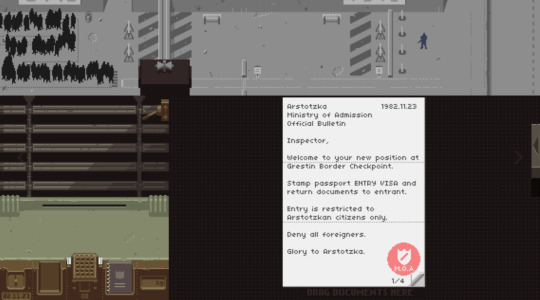

Papers, Please casts you in the world of Arstotzka which is deliberately low resolution with muted colours where it’s says that you have a job only because you were lucky enough to win a lottery, and that if you do good work, your family won’t die of poverty. This informs players that they will need to perform efficiently not to be the best, but just to merely survive. In Papers, Please the tasks are personified in often wrenching human aspect, each with their own stories and reasons for trying to enter the country (such as when a husband and wife come through and only the husband has the appropriate documentation). This adds a moral dilemma for the player and they must decide whether to be compassionate and let individuals through, or abide by the government’s rules.
Papers, Please is impressive in how it merges its gameplay with narrative. What could be a somewhat tedious puzzle game is transformed into a cold war thriller, complete with family hardship and revolutionary cults.
Quotes from Lucas Pope — sole developer of Papers, Please:
“My primary goal with the art was to portray the bleak setting simply and effectively. Because I had to do the art, programming, music, design and sound, I needed to work efficiently on each component. The simple pixel style made it easier to represent the oppressive setting and to design the large number of documents in a clear and concise way. This same restrained style extended to the music and sound.”
The initial inspiration came from watching airport immigration inspectors at work. The shuffling of papers and correlation with their computer screens looked like fun work. When developing the idea more, I thought about common spy fiction that involves slipping through security checkpoints undetected. The Bourne films are a good example of this. Instead of following the hero I thought it’d be interesting and fun to play as the other side, working to catch the spies, criminals, terrorists and smugglers trying to slip through.
1 note
·
View note
Text
Stop, Look and Listen: “Return of the Obra Dinn”

[This post brought to you with major spoilers for Lucas Pope’s 2018 game “Return of the Obra Dinn”.]
"Literature makes us better noticers of life; we get to practice on life itself; which in turn makes us better readers of detail in literature; which in turn makes us better readers of life.”
- James Wood, How Fiction Works
And so it begins - it’s finally games industry season, folks, and we are in the thick of it, with conferences, game jams, awards ceremonies and publisher announcements happening even faster than even fans can keep up with. (In the first draft of this post, I listed out just the events that *I* keep up with, and this paragraph was three times as long as it is currently. You’re welcome for the edit.)
It’s a whirlwind, and, with great titles being announced and honored left and right, something will always fall through the cracks. But one thing that I’ve been sure not to miss with all the hubbub is that my personal Game of the Year 2018 is getting plenty of attention, and for good reason.
“Return of the Obra Dinn” -- the latest release by “Papers, Please” creator Lucas Pope -- released in October 2018 to favorable reviews (or Overwhelmingly Positive, if the gamers of Steam have anything to say about it) and has been receiving recognition since. It took home the Independent Games Festival’s Seumas McNally Grand Prize AND the award for Best Narrative at the Game Developers Choice Awards on Wednesday. It’s been nominated in six categories at the 15th British Academy Games Awards (happening April 4). And so far, it seems to be defending its title as the top-ranked indie game on Polygon’s Game of the Year chart (behind “God of War”, of course.
The game is part two-tone logic puzzle, part nautical horror and part historical science/magic fiction. The player is cast in the role of an insurance adjustor sent by the East India Trading Company in 1807 to determine the series of circumstances that turned the Obra Dinn into a veritable ghost ship, damaged and devoid of crew after being lost to the open sea for five years.
Using the Memento Mortem, a magical little device that allows the player to travel back and explore vignettes anchored to the deaths of crew members, one must collect data to determine the identity, title, cause of death (if they are indeed dead) and nefarious actions of each person who’d been aboard the ship when it set sail in 1802. The visual scenes are centered around the exact moment of death, giving the player a look into the fate of each person aboard the ship, as well as the immediate circumstances of their demise. Ultimately, it’s discovered that the Obra Dinn was ravaged by not only the common misfortunes of the sea - mutiny, illness, in-fighting among the crew - but also far more monstrous forces of nature: Giant crabs, a kraken, vengeful mermaids... The kinds of things one might expect a cursed crew to go up against.
It’s a game played in “past present” tense, where the player simultaneously feels like a part of the action and knows that they are only observing it from a point in the future, and it isn’t necessarily easy. One must rely on visual references in death scenes, an unattached list of names, two drawings of the crew and seconds-long audio clips at the investigation of each new corpse to make judgements on each person’s fate. Sometimes the clue that makes an identity clear is an accent. Sometimes it’s an identifier posted obscurely somewhere in the environment. Sometimes it’s just the process of elimination. But almost always, it’s driven by the detail of the scenes the player is examining.
Because it relies so heavily on specifically captured snapshots, “Return of the Obra Dinn” doesn’t have the privilege of skimping on detail. Whereas in many games, Easter Eggs and environmental detail are considered a bonus for players who carefully examine the game’s setting instead of blazing through, Return of the Obra Dinn relies on more methodical playthrough. Its environments are meant to be combed through, to be examined from all angles, even going so far as to hide a vital corpse inside one of the ship’s walls in one portion of the game.
A lack of narration (apart from the short snippets of conversational audio accompanying each scene) lends the ship both a sense of haunted quiet, and the opportunity for the story to unfold solely based on the findings of the player. This contrasts it to other “post-mortem”-style investigation games like Fullbright’s “Tacoma,” where we see the story unfold with the help of the crew’s movement and dialogue records in addition to detailed props. Instead, what we have is an information driven plot, organized in by the tools the player is given at the beginning of the game.
On a sensory level, blood splatters, raindrops, expressions and distinctive character traits (outfits, appearance, accents, responsibilities aboard the ship) must also be rendered in enough detail that we, as an adjustor stepping into the situation for the first time, can successfully determine most, if not all, that happened. It doesn’t just matter who killed whom, but also how, and when, and where, and why. And with 60 passengers aboard the ship (and 58 solvable fates in the main portion of the game) the differences between them can be the difference between completing the game and leaving it unfinished. It’s here that Return of the Obra Dinn intentionally approaches a “thisness” - a concept originating back to the 13th Century that denotes a sense of specificity in a thing rather than its universal qualities - that many games don’t. Rather than focusing on a specific few crew members to investigate and creating stock folks to quietly inhabit the scenes, each person aboard the Obra Dinn has a specific identity and fate, unique to them, that affects how the story of the ship as a whole plays out.
What results is a feeling of completion and quality in the game, but also a strange sense of realism. In the assumed role of insurance investigator - a title that is purposely made to feel very official at the game’s beginning - there is a completed circuit of logic in every person having a face, a name, a role, and ultimately a fact to report back about. The role feels thorough rather than ironic, and with that comes a sense of pride at discovering even the smallest fate.
In “How Fiction Works”, writer and professor James Wood reminds us that great literature, full of just the right detail to set a scene and enhance a story, makes us better observers. Where the characters notice details in their world, we too notice details in ours. In gaming, we take that role further, stepping into the shoes of the character in a way that lets us not only observe but move through a scene with ease. In “Return of the Obra Dinn,” it’s the details that allow us to do that. It’s the details that convince us that we are the only thing standing between the Obra Dinn and obscurity, the only thing tethering it to shore and letting it succumb to its ghosts entirely.
0 notes
Text
Yes, Your Grace review – punishing, overly bleak kingdom management • Eurogamer.net
After a long development journey since its arrival on Kickstarter in 2015, Yes, Your Grace is finally here, smaller than previously proposed, but with its original idea intact – almost a metaphor for my own in-game kingdom after I’ve tried my best to be a good and just king.
You play as Eryk, King of Davern, who each week welcomes petitioners to his halls to listen to their problems and hopefully find a satisfactory resolution. A line of petitioners forms in your throne room, which can include pleas from poor peasants, offers from merchants or requests from your three daughters and your wife. While your family needs you to mediate or put your foot down as head of the household, whether it’s soothing your wife’s worries at the state of things or your teenage girls bickering amongst each other, other petitioners have more practical needs: gold or supplies. A quick glance at your resources, permanently visible at the bottom of the screen, tells you what you have available. Spoiler alert: it’s not much. It never is, and that’s the whole point. For every request you grant there will be dozens you’ll have to decline, managing a tight balancing act between keeping your people moderately happy and your coffers and supply stores filled.
Yes, Your Grace review
Developer: Brace at Night
Publisher: No More Robots
Platform: Reviewed on PC
Availability: Out now on PC
Yes, Your Grace has three distinct phases following plot developments. The first hour is like a tutorial – here you only dole out resources or send out your general with the highly medieval name Stan to solve arguments or protect villages from bandits. Everyone is still moderately happy. But soon war is brewing as the Radovians, barbarians from beyond the mountains, come to collect on the princess you promised them 13 years ago. There’s nothing for it but to quickly marry her off to someone else to gain an army, then start preparing for war. I don’t want to spoil everything but it’s safe to say that things only get progressively worse from there on out, not only because you now have more demands than ever to juggle. Besides your general you can use a witch and a hunter as your agents. They sort magic- or animal-related mishaps or scout the kingdom for supplies. Alliances with lords need to be forged, and your castle needs to be fortified. Agents are paid in advance, soldiers need to be fed, and then there’s that pesky bank loan I took up that’s now steadily draining away my funds…
youtube
At times, decision-making in Yes, Your Grace feels like standing at a conveyor belt. Perhaps purposefully so, seeing as YYG’s creator Rafał Bryks was strongly inspired by Lucas Pope’s Papers, Please. And yet, as I compare Yes, Your Grace with all the other tough decision-making sims out there, from Frostpunk to The Banner Saga to Not Tonight, it falls flat in one important aspect – humanity. Beyond a happiness stat I need to maintain to avoid a game over, there’s nothing for me in this row of lemmings that makes me feel for them. Sometimes this is due to situations turning out unintentionally humorous. Instead of voiceover in a language, in YGG characters begin each sentence with a made-up language. This can work, the way it did in Supergiant’s Pyre, but this is too lilting, too close to Simlish – King Eryk wailing a plaintive “Doy” before swaying and falling from his throne in a fainting spell or the happiness metre going down to the sound effect of a sitcom studio audience aww-ing are unintentionally funny and break immersion.
That’s especially jarring as Yes, Your Grace is anything but funny most of the time, both narratively and mechanically. There’s a fine line between a game being challenging and covering difficult themes and it just being frustrating to play. This isn’t to rehash the “do games have to be fun?” debate of yesteryear, but even the bleakest games make concessions for their players, whether they allow room for mistakes or throw you a lifeline. Nothing of the sort happens in Yes, Your Grace, and to me that’s a case of realism being taken too far.
On the Brave At Night blog Rafał Bryks shares some insights into his pixel art workflow, which resulted in stunning scenes like this.
Losing is an abrupt affair, usually down to a single misstep. The game does save at the end of each week, but unless the mistake that led to you losing took place in your previous turn, you have to replay quite a chunk of content with no skip button. Some problems also seem down to pacing errors – by the third phase of the game, I had no tax income and a new source of income I had devised in the second or third week started paying exactly one round before the last battle.
I enjoyed the parts of Yes, Your Grace that took part away from the main gameplay loop around resource distribution. Eryk’s family is a charming lot, with all the bickering and occasional teenage rebellion that make for a believable family dynamic. The writing is solid all around, from the large variety in requests to the main story surrounding the wars I watched everything unfold with interest. You wage two battles, and in both you give orders to your soldiers and may get some extra help here and there depending on the decisions you made before. The battles were not only exciting, but also a great break from taking care of petitioners. The pixel art is really pretty and detailed, especially the scenes set at night are lovely to look at and you can even tell each peasant clearly apart by their clothes and hairstyles.
Yes, Your Grace isn’t unbeatably difficult by any means, but it comes down to single, completely unredeemable choices so often that doing well without the benefit of hindsight is never the result of careful planning so much as sheer dumb luck. At the end, I may have won the war, but it came at great cost, resulting in an ending so devoid of hope my efforts seemed completely empty, ultimately making my efforts feel largely wasted.
from EnterGamingXP https://entergamingxp.com/2020/03/yes-your-grace-review-punishing-overly-bleak-kingdom-management-%e2%80%a2-eurogamer-net/?utm_source=rss&utm_medium=rss&utm_campaign=yes-your-grace-review-punishing-overly-bleak-kingdom-management-%25e2%2580%25a2-eurogamer-net
1 note
·
View note
Text
Return Of The Obra Dinn May Still Come To Switch
Return Of The Obra Dinn May Still Come To Switch
[ad_1]
Return of the Obra Dinn, a narrative mystery game from Papers, Please creator Lucas Pope, surprised and delighted the world when it released on PC last year. It even cleaned up at both the IGF and GDC Awards just last month, so it’s a game people really enjoyed playing. Much like every indie game, however, people have requested a port to Switch, and Lucas Pope has heard you, but…
View On WordPress
0 notes
Text
Game of the Year 2018
2018 was an interesting year for games. While there wasn’t as much depth as previous years, the games that stood out were truly something special. This was certainly a year where big franchises that had been dormant for a few years came roaring back, but more importantly some developers released some truly unique new IP that took the industry by storm. All of this combined for some great experiences that won’t soon be forgotten. There wasn’t a ton of games I thought were fantastic outside of the top 10, but this was one of the most difficult years to order the top 10 as the quality of each game was unbelievable.
As always, the rules for inclusion are as follows:
The game must have its final retail release in 2018. Thus, anything in an alpha/beta state or Steam Early Access does not qualify. This rule is still being under consideration for removal.
In the case of episodic games, they must have their final episode delivered in 2018 to make the list.
While this list is comprehensive, I haven’t played everything. Games like Assassin’s Creed Odyssey, Dragon Quest XI, Hitman 2, Forza Horizon 4, Florence, and The Messenger all seem great but are unfortunately all still on my backlog.
Most importantly: the game has to be really good. No-brainer there.
Honorable mentions:
While this year wasn’t as competitive past the Top 10, there were a few other games I played that deserved mentions as my final cuts:
Monster Hunter World - This was a causality of not having enough time to get deep enough in the game, but from what I played MHW does a great job making the series more accessible to a broader audience. Octopath Traveler - The game oozes style and has a great combat system, but unfortunately the late-game repetition and disjointed story keeps it from becoming something great. Yoku’s Island Express - It was truly a unique idea to mix pinball with Metroidvania, and it pays off with a fun game and a great soundtrack.
Without further ado, here are my top 10 games of 2018:
10. Super Smash Bros Ultimate (Bandai Namco/Sora - Switch)
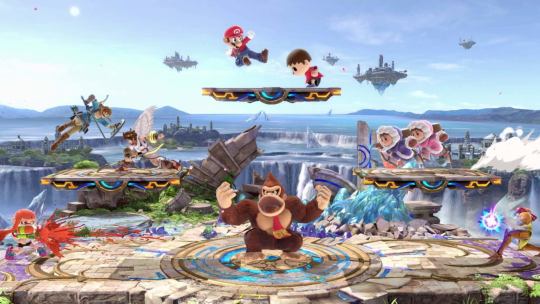
The follow up to Smash Bros for Wii U/3DS, this entry once again delivered. Nintendo managed to bring back every character that has ever been in a Smash game, including characters that were cut from previous installments for various reasons. The team managed to make enough subtle tweaks to most characters to keep the brawler as entertaining as usual. However, the standout mode in this version has to be in the massive single-player Spirits system. There are over 1,000 unique spirits to collect in this game, and to unlock most of them you need to complete a special battle that represents the character of the spirit you are trying to unlock. These clever fights help pay homage to characters that don’t make the cut for Smash, and it is a nice touch to help add several dozens of hours of fun moments.
9. Into the Breach (Subset Games - PC, Switch)
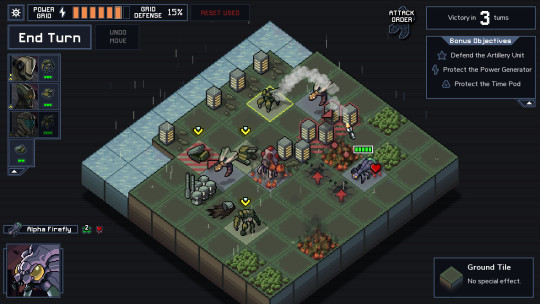
Following up to their 2012 indie hit FTL, Subset Games is back with another clever run-based adventure. Into the Breach is something all its own though, as this turn-based strategy game tasks you with using a few mechs to defend various cities and structures from an invading alien menace. Customization is key here, as you are able to unlock multiple squads and pilots that help completely modify your strategy to save the world. One of the more brilliant parts of the game is that almost all the information is provided to you prior to each turn. You know exactly where each enemy is going to attack the following turn, so the goal isn’t just to eliminate your foe, but also disrupt them. If you see your opponent is poised to barrel ahead in a straight line towards a building, you can use a ranged attack to instead knock it of its path so that it instead rams into another adversary. While it is incredibly challenging to have the perfect turn, everything is within your control so you know it was your fault if things go wrong. Ben Prunty also delivers an incredible soundtrack yet again, as his melodies help really set the atmosphere for each tense battle.
8. Red Dead Redemption 2 (Rockstar Studios - PS4/XBO)
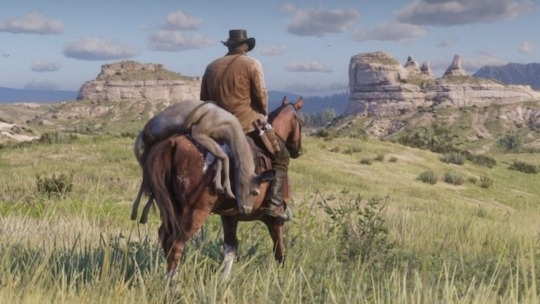
Easily the most talked about game of 2018, Rockstar’s prologue to their 2010 western is an incredible technical achievement. The amount of detail that goes into every aspect of this game seems mind-blowing, and it is quite easy to lose yourself in the world that has been created. The story is also one of the biggest improvements in the game this time around, as seeing how Dutch’s gang fell leading to the events of the previous installment is a fascinating tale. The protagonist, Arthur Morgan, has one of the more gripping character arcs seen in the past few years. There is an absolute ton to accomplish in this game, as it is constantly introducing new side quests as well as presenting random stranger events that help make everything feel very alive. Unfortunately, sometimes the gameplay gets in its own way, and some of the later missions can be a repetitive slog despite the gripping story being told. This is one not to be missed, but there’s just enough keeping it from being a true classic.
7. Donut County (Ben Esposito - iOS, PC, PS4, Switch, XBO)
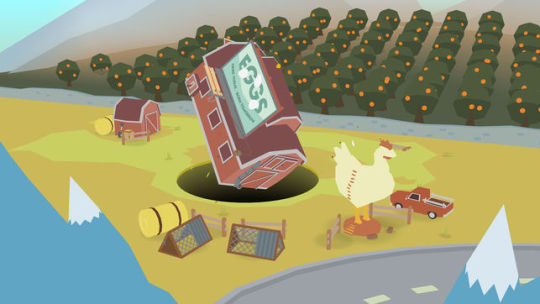
Donut County is easily the weirdest game on this list as this is a game where you play as a hole. While in most games that have pits you are used to avoiding them, here you are actually trying to have as many characters and objects fall into a hole as possible. The puzzles aren’t difficult at all, but every time you suck something up, the hole gets larger so that you are able to go after larger items until nothing is left on screen. It is a unique concept that works, and it is something that anyone can play. What ties everything together though is the tremendous cast of characters in the game, as BK the raccoon and everyone around him will keep you laughing the entire way through. There is a journal in the game, the Trashopedia, which includes hilarious descriptions written by a raccoon describing real world items. It is worth ready every single entry. The soundtrack does a great job pulling everything together, and the game only being 2 to 3 hours makes it a great quick jaunt for everyone.
6. Tetris Effect (Monstars Inc/Resonair - PS4)

At this point, everyone knows what Tetris is. So, there’s nothing new that can be done with Tetris, right? Wrong. Tetsuya Mizuguchi, the mind behind Lumines, helped gets the rights to Tetris so that his studio could help work on a version of Tetris that functioned similar to his music-based puzzler. While he only served as a producer on the title, his influence is clearly seen. The hallmark mode, Journey, has you making a specific number of lines as the speed changes based on the tempo of the song that is playing. All the while this is happening, interactive backgrounds also animate to the rhythm. Once you hit your line goal, you keep your blocks on screen, but you are then transported to another song and environment to continue on with its own tempo with a new count of lines to achieve. While the game was initially built for VR, it plays just fine on a normal TV and will have you glued trying to get that classic four line namesake. The presentation also extends to multiple other challenging modes, including trying to build the highest combo as well as using 3 or 4 blocks to clear every line on a puzzle. The weekly events will keep you coming back, and overall this a great package to help revitalize one of the best games ever created.
5. Marvel’s Spider-Man (Insomniac Games - PS4)
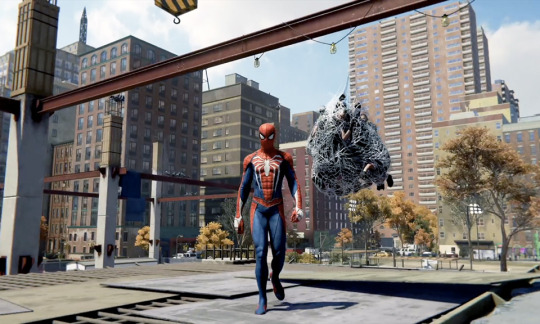
While the previous generation saw great comic success with the Batman Arkham series, it was often wondered when some other classic heroes would get a resurgence in the gaming world. It took a while, but Insomniac found a way to capture that lightning with their PS4-exclusive Spider-Man. Skipping the origin story that has been told to death at this point, you are transported into the life of Peter Parker years after he has already become Spider-Man and several of his foes are already locked up in the Raft. Certain characters have yet to become their iconic villainous forms yet, while others are already terrorizing New York City like the Shocker. A unique Spider-Man story is told here, as with the change of canon you aren’t sure the twists and turns each character arc is going to take which always keeps you on your toes. Most importantly, the gameplay here is a blast. Previous Spider-Man games always have trouble making it feel fun to swing around the city, but Insomniac’s version has you darting around the city with ease. Random events happen in the city in real time, and everything is so tightly packed that you can accomplish anything even if you only have small amounts of time to play. There are great nods to Spider-Man and Marvel lore through with Peter’s costumes and collectibles. The underrated gem of the entire experiences are the sequences where you play as Mary Jane and Miles, as their ventures help show that everyday people are just as important to Peter’s success as Spider-Man is.
4. Return of the Obra Dinn (3909 LLC - PC)
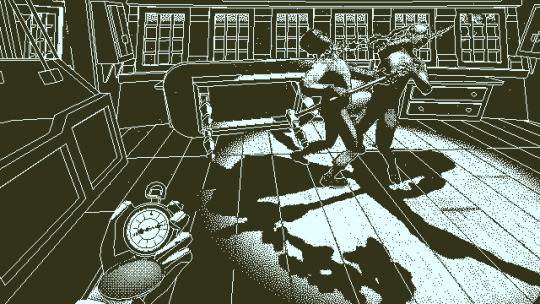
Definitely the most unique game on the list this year, Return of the Obra Dinn casts you as an insurance claims collector that needs to catalog the deaths and disappearances of a few dozen people from an abandoned ship that has just returned. Ok, that might not sound captivating at first, but stay with me. Lucas Pope (creator of Papers Please) made one of the most novel puzzle games here, as you are given an empty journal and an artist’s rendition of everyone who was aboard the doomed vessel. You are then able to walk up to any corpse on the boat and be instantly transported back to the exact moment of their demise. Sometimes you hear brief dialogue, but mostly you are just able to walk around a still scene of the exact moment of their death. Here, you walk around and try to figure out who the person is, how they died, and who else was there. While you can typically figure out how the person died, the true puzzle solving comes with finding out the names of who each person is from their involvement in other scenes, and it creates a deep loop of investigation and revisiting moments. There truly is nothing like this game, and the unique look helps it give it a style all its own.
3. God of War (Sony Santa Monica - PS4)
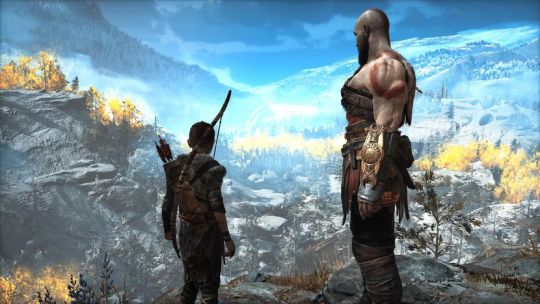
While multiple franchises saw returns this year, none had more of an impact than the return of God of War. Previous installments in the series saw Kratos as a bloodthirsty screaming god looking for revenge, but this time around he moved away from Ancient Greece to Midgard for a quieter life where he is taking care of his son Atreus. His wife in this realm has recently passed, and your objective is to honor her last wish of spreading her ashes at the highest point in the realm. Part of what makes this entry in the series so satisfying is that it slows down the adventure and gives more weight to the combat as well as more options to vanquish your foes. The light-RPG system implemented helps you determine what skills Kratos can utilize and lets your specialize your character more than previous games. While the combat is great, the world and its story is what takes center stage here. Kratos’ relationship with his son makes for great moments throughout and does a lot more to humanize Kratos compared to previous games in the series. The supporting cast does a great job of making the world feel alive as well, especially Mimir who will help give insight to the history of everything around you in real time as you travel. Kratos’ return is a triumph, and it helped make me care about a franchise that I thought I had lost all interest in. The ending was left very open, so its very exciting to see where Sony Santa Monica goes from here.
2. Dead Cells (Motion Twin - PC, PS4, Switch, XBO)
youtube
Early Access has been a system that has certainly had its ups and downs, but Dead Cells just may be the best thing to ever come out of the program. There have been games in the past that have attempted to fuse Metroidvanias and rouge-lites, but none have succeeded like this. It’s simple, at the beginning of every run you are given a melee weapon and a choice of one other weapon, all of which differ depending on what you have unlocked so far. From here, you’re free to explore the first level of the game and keep any upgrade that you find. Also along the way you occasionally pick up cells from enemies, which serve as your currency for upgrades. However, if you die before the end of a level, you lose everything that you picked up so far in that area. This helps build tension when you’ve gotten a rare blueprint for a new item or a large number of cells, as you want to make sure you can reach the collector who will essentially bank your cells and let you buy things to improve future runs. Its a loop that works.
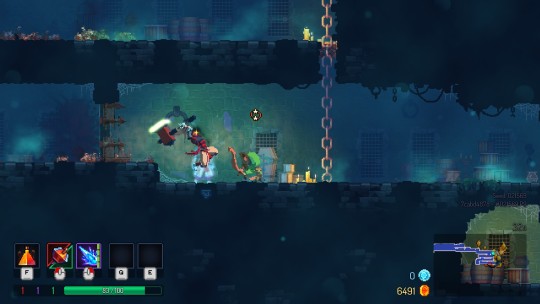
While the upgrade system, the unique weapons and skills, and branching paths help set this rogue-lite apart, the true glory in Dead Cells is the combat and how tight the controls are. There are few 2D action games that feel this good to play, and it makes some of the more frantic levels an absolute blast. You’ll certainly get to the first boss in an early run, but he’ll likely demolish you. Improve yourself a little bit, and the next time you get back to him you see progress but still no victory. Hone your skills more, and the next thing you know it you are trouncing the first boss every single time you get to him. Then as the game ramps up in difficulty in the following levels, you learn to adapt in new ways to advance even more. After tons of runs and hours, you’ll eventually find yourself at the final test: The Hand of the King. He is without a doubt the hardest aspect of this game that will do everything to crush what you thought was a perfect run. But when you finally have a run that allows you to land that final blow and defeat him, it is something special that encapsulates the beauty of perseverance in this game. This just might be the best rogue-lite since Spelunky.
1. Celeste (Matt Makes Games - PC, PS4, Switch, XBO)
youtube
At the beginning of the game, you’re told that Celeste is a game about climbing a mountain. While that is very true, it’s about much more than that. Celeste is a precision platform that stars a young girl named Madeline who is setting out to climb Celeste Mountain to prove she can do it. Her intentions aren’t crystal clear at first, but she’s told by one of the other NPCs that she’ll fail. She has told by her mother in a dream sequence that she’ll fail. She’s followed by a dark version of herself that tells her that she’ll fail. It becomes evident quickly that this is a game about conquering your own anxiety and doing something outside of your comfort zone.
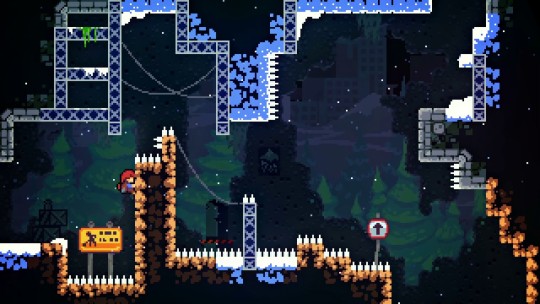
While Celeste draws inspiration from games like Super Meat Boy and I Wanna Be the Man, there is enough to give the game its own identity here. This game is punishing, but at the same time it is incredibly fair. Anytime you die, you are sent back immediately to the beginning of the screen. This allows you to easily evaluate how you made a mistake adjust or fine tune your strategy from there. Soon obstacles that seemed impossible are nothing to you, and you instead need to figure out how to get through the next roadblock. You get better and learn something every time you die, and that helps you propel forwards better than other similar games in the genre. There are also collectibles hidden on most screens known as strawberries, and they serve as an extra challenge to help make each level even harder if you want to take the extra step. But the true difficulty lies in the bonus B-side and C-side levels that unlock should you find the other collectibles in each level. These are remixed levels that are shorter than the main game but present new twists on the mechanics of each world, leading to one of the most rewarding feelings should you be able to conquer these. They are not for the faint of heart.
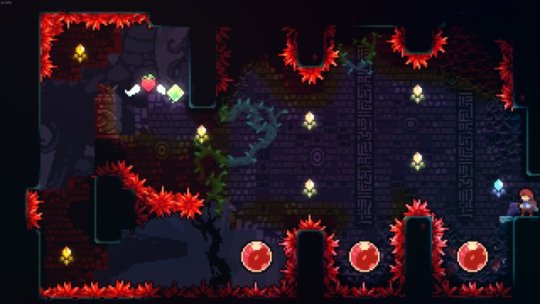
0 notes
Text
Return of the Obra Dinn – First person adventure from Papers, Please creator Lucas Pope
Welcome to "Return of the Obra Dinn", a first person ghost ship adventure game from Lucas Pope, creator of that fine Indie title "Papers, Please". Developed through a very unique art style of which I haven’t seen since the old Mac days, you play as an insurance adjuster for the East India Company and must board the Obra Dinn, recover the Roll Book and find out what actually happened on that
source http://reposts.ciathyza.com/return-of-the-obra-dinn-first-person-adventure-from-papers-please-creator-lucas-pope/
0 notes
Text
‘Papers, Please’ creator debuts ‘Return of the Obra Dinn’
‘Papers, Please’ creator debuts ‘Return of the Obra Dinn’
Return of the Obra Dinn, the first-person mystery from Papers, Please creator Lucas Pope, is now available. The game has been in the works for some time, with Pope revealing the project and releasing an early demoback in 2014, and it features a rather distinct aesthetic, due to Pope’s use of 1-bit rendering. “I’d like to capture the detailed black and white look of old Mac games in a…
View On WordPress
0 notes
Quote
Time to get your sea legs on and step aboard a ship full of maritime mysteries in Return Of The Obra Dinn, released today and latest from Lucas Pope, creator of Papers Please. A first-person murder mystery presented in grainy monochrome, players fill the well-worn shoes of an insurance investigator for the East India Company in 1807. A ship long thought lost has turned up again, and all the crew have been replaced with very dead skeletons. There’s a mystery to solve, and only a deductive genius (who can also see the past) can crack the case. Sleuth on. (more…)
http://www.epicmeetsfail.com/2018/10/return-of-obra-dinn-mysteriously-floats.html
0 notes
Text
A new trailer goes deeper into the mystery of the Obra Dinn
A new trailer goes deeper into the mystery of the Obra Dinn
[ad_1]
Return of the Obra Dinn, the next game from Papers, Please creator Lucas Pope, got a new trailer yesterday showing more of its stylized visuals and providing deeper hints at the story inside this nautical mystery.
Return of the Obra Dinn’s looks pay homageto the very low-resolution, digitized graphics of adventure games for the Macintosh back in the 1980s. But the perspective and the…
View On WordPress
0 notes